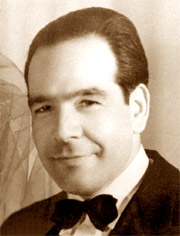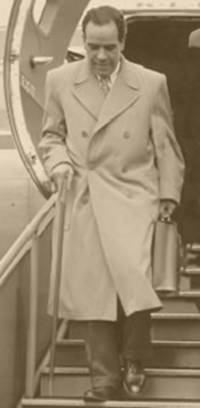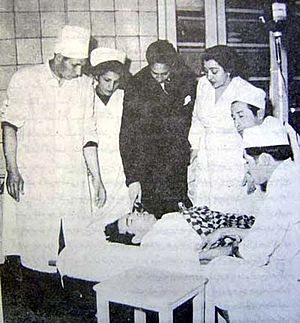Hossein Fatemi facts for kids
Quick facts for kids
Hossein Fatemi
|
|
|---|---|
 |
|
| Minister of Foreign Affairs | |
| In office 16 September 1952 – 19 August 1953 |
|
| Monarch | Mohammad Reza Pahlavi |
| Prime Minister | Mohammad Mosaddegh |
| Preceded by | Hossein Navab |
| Succeeded by | Abdolhossein Meftah |
| Member of the Parliament | |
| In office 27 April 1952 – 16 September 1952 |
|
| Constituency | Tehran |
| Personal details | |
| Born | 10 February 1917 Nain, Sublime State of Persia |
| Died | 10 November 1954 (aged 37) Tehran, Imperial State of Iran |
| Cause of death | Execution by firing squad |
| Political party | National Front |
| Spouses |
Parivash Satvati
(m. 1951) |
| Children | 1 |
| Alma mater | University of Tehran |
Hossein Fatemi (Persian: حسین فاطمی; also Romanized as Hoseyn Fātemi; 10 February 1917 – 10 November 1954) was an important Iranian figure. He worked closely with Prime Minister Mohammad Mosaddegh. Fatemi suggested that Iran should take control of its own oil and gas. He started as a journalist. Later, he became Iran's foreign minister from 1951 to 1953. In 1953, the government of Mosaddegh was overthrown. Fatemi was arrested and sadly, he was put on trial and executed.
Contents
Early Life and Education
Hossein Fatemi was born in Nain on 10 February 1917. He was the youngest of five children. He went to school in his hometown. As a teenager, he moved to Isfahan for more education. He openly disagreed with the ruler, Rezā Shāh. He shared his opinions in his newspaper articles.
From 1944 to 1948, Fatemi studied in France. There, he studied journalism and also law. He finished his studies in 1948.
Career and Activities
After finishing his studies, Fatemi returned to Iran. He helped start a daily newspaper called Bākhtar (West) in Isfahan. From 1949, Fatemi was an active member of the Iranian National Front. This was a democratic and nationalist group led by Mosaddegh.
Later, his newspaper moved to Tehran. It became the main voice for the National Front. Fatemi also wrote for another newspaper in Tehran called Mard-i Imruz. In October 1949, Fatemi and 18 other Mosaddegh supporters protested. They did this because they could not get seats in the Parliament.
Fatemi worked as an assistant to the prime minister. He was also a representative for Tehran in the Iranian parliament. When he was 33, he became the minister of foreign affairs. This happened in October 1952 in Mosaddegh's government. He took over from Hossein Navab. According to Mosaddegh, Fatemi was the one who first suggested that Iran should take control of its own oil.
Assassination Attempt
On 15 February 1952, Fatemi was giving a speech. He was at the grave of a journalist named Mohammad Masud. Masud had been killed in 1948. During the speech, someone tried to kill Fatemi. The attacker was Mohammad-Mehdi Abdekhodaei from a group called Fadayan-e Islam. This group had also planned to kill Mosaddegh.
Fatemi was badly hurt in the shooting. He was unable to work for seven or eight months. He also had lasting injuries from the attack.
Arrest and Execution
In August 1953, Mosaddegh's government was overthrown. This happened during a coup d'état. Before the coup, some Western news reports said Fatemi was a "communist threat" to Iran.
On 15 August, Fatemi was supposed to be arrested. Mosaddegh and others were also targeted. But the first attempt to overthrow the government failed. Fatemi was arrested by some royalist officers. They were in such a hurry that he wasn't allowed to put on his shoes. But he was soon released. He went straight to Mosaddegh's home.
The ruler, Mohammad Reza Pahlavi, fled to Baghdad. He was afraid because the coup seemed to have failed. The next morning, Fatemi told Mosaddegh to declare Iran a republic. This was because of the failed coup. That evening, Fatemi wrote a strong article in his newspaper, Bakhtar-e Emruz. He also gave a public speech. In it, he called the Shah "bloodthirsty" and a "servant of the British."
On 19 August, Fatemi's newspaper offices were attacked and burned. Mobs, encouraged by an Iranian agent, did this. Later that day, the second coup attempt succeeded. Mosaddegh was arrested. Fatemi went into hiding. He stayed in a safe house.
He started writing his life story. But after 204 days, he was found and arrested on 13 March 1954. During his capture, his sister, Saltanate Banoo, was killed trying to save him. Fatemi was then mistreated. On 10 October, a military court found him guilty. He was sentenced to death. Mohammad Reza Shah later wrote that he "was unable to prevent the execution of Hossein Fatemi." He claimed it was because Fatemi was a "communist."
Fatemi was executed by a firing squad on 10 November 1954. This happened at Ghasr barracks in Tehran. He was still sick with a fever and his old injuries. Fatemi was buried in Ebn-e Babooyeh cemetery. This cemetery is in Shahr-e Ray, near Tehran.
Personal Life
Hossein Fatemi married Parivash Satvati on 27 November 1951. Fatemi was 15 years older than her. Her father was an army general. Her sister, Manijeh Rahimi, was the widow of Mehdi Rahimi. He was a military officer who was executed after the Iranian revolution.
Fatemi and his wife had a son. Their son was only seven months old when Fatemi was executed. After her husband's death, Parivash Satvati left Iran. She settled in the United Kingdom with her son.
Legacy
There is a street in Tehran named after Fatemi. Mosaddegh often said that Fatemi was the main person behind the idea of taking control of Iran's oil. After the 1953 coup, the Shah gave back half of Iran's oil and gas rights. This mainly went to US and UK oil companies. A small part went to French and Italian companies. This was part of a new deal called the Oil Consortium.
Other countries in the Persian Gulf and North Africa followed Iran's example. They also took control of their own oil and gas fields. President Nasser of Egypt was influenced by Fatemi's idea. He later took control of the Suez Canal.
Images for kids
-
Fatemi with Mohammad Mosaddegh at the United Nations Security Council





